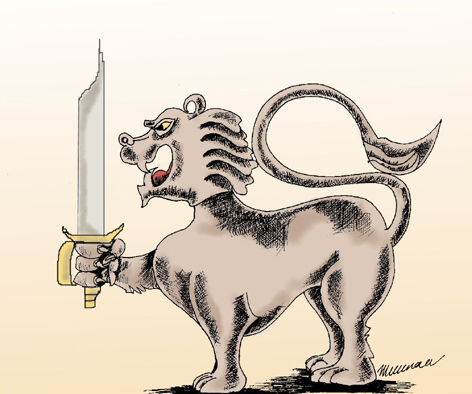
Illustration: Munaa
Sri Lanka has taken on a dangerous coronavirus containment strategy. Faced with a public health crisis, the state has driven through authoritarian measures and deployed a military accused of systemic rights abuses. The response so far has been deeply troubling. Thousands have been forcibly sent to military-run quarantine centres, whilst an arbitrary curfew has seen thousands more arrested and livelihoods threatened – particularly in the war-torn North-East. The free hand given to the armed forces has already seen gross abuses of power. This is not how a pandemic should be handled.
As states around the world geared up to face the coronavirus crisis, Sri Lanka’s regime immediately signalled the authoritarian approach it was going to pursue. Shavendra Silva, an army commander accused of crimes so egregious that he is barred from travel to the US, was chosen to head up the state’s coronavirus task force. Armed soldiers took over buildings to set up makeshift ‘quarantine centres’, ignoring ongoing Tamil protests. Military intelligence operatives and even drones were deployed, whilst the state admitted that it had acquired “the assistance of telecommunication companies”. With parliament still dissolved and a curfew of questionable legality in effect, Sri Lanka’s security apparatus has effectively been given a carte blanche.
This is a grave mistake. The assault of Tamil villagers on Friday, the aftermath of which was caught on camera, served another brutal reminder as to why. The police attacked children and women, breaking teeth and knocking them unconscious. There has been no government response and no one has been held accountable. With the incident almost entirely ignored in the south, as ever, it seems this will go unpunished and shows once more the state will not hesitate to deploy violence with impunity – especially towards Tamils.
The Tamil homeland too has been hit devastatingly hard by a military enforced curfew. Livelihoods are being decimated with many struggling to earn a daily wage and local authority funds deadlocked by Colombo. Though the Tamil diaspora has provided a vital lifeline, reports are now emerging of families in the North-East facing starvation. When individuals have attempted to engage in relief work, they have faced arrest and had their aid supplies confiscated. As pointed out by the Jaffna-based Adayaalam Centre for Policy Research, none of these actions have any basis in law. For the state, however, this pandemic has been utilised as another opportunity to tighten its militarised grip on the North-East.
None of this is out of step for Sri Lanka’s ruling regime. Indeed, Sri Lankan president Gotabaya Rajapaksa has never shied away from showcasing his authoritarianism – his continued refusal to reconvene parliament a case in point. Instead, he has chosen to entrench it further. Alongside his personal record of directing atrocities, his disregard for human rights, his ruthless silencing of a free press and the state’s fanning of hate speech against Tamils and Muslims, the ramifications are deeply concerning. Sri Lanka is regressing further towards a more violent and more openly repressive ethnocracy.
International donors, in particular, must bear this in mind. For too long they have proved to be an uncritical source of funding for a Sri Lankan state that routinely commits rights abuses. As Colombo grapples with a worsening economic crisis, it has begun reaching out abroad for concessions. Millions of dollars have already been pledged “to support Sri Lankan efforts”. Any assistance provided, however, must face careful scrutiny. There can be no engagement that legitimises Sri Lanka’s militarisation. Instead, that militarisation must be halted and reversed. Whilst the world focuses on tackling the pandemic, Sri Lanka’s illiberal turns cannot be allowed to continue unchecked.
We need your support
Sri Lanka is one of the most dangerous places in the world to be a journalist. Tamil journalists are particularly at threat, with at least 41 media workers known to have been killed by the Sri Lankan state or its paramilitaries during and after the armed conflict.
Despite the risks, our team on the ground remain committed to providing detailed and accurate reporting of developments in the Tamil homeland, across the island and around the world, as well as providing expert analysis and insight from the Tamil point of view
We need your support in keeping our journalism going. Support our work today.
For more ways to donate visit https://donate.tamilguardian.com.

